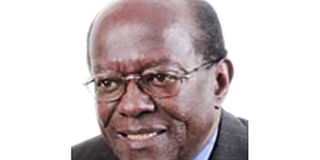Age limit amendment Bill is procedurally unconstitutional

Peter Mulira
The debate about the Constitutional (Amendment) Bill No. 2, which seeks to remove the presidential age limit, has divided the country more than anything else in recent years.
The movers of the Bill, must shoulder the responsibility for this public disunity because they did little background preparation to separate politics from constitutional issues.
The assumption which motivated the mover’s action was that the Bill would pass simply because they had the parliamentary majority. This was political amateurism, which showed the need for sober deliberation in our public affairs, if the country is to be saved from past mistakes.
Article 102, which has caused the political flak reads: “A person shall not be qualified for election as president unless that person is:
. A citizen of Uganda by birth;
. Not less than 35 years and not more than 75 years of age; and
. A person qualified to be a member of Parliament.”
The point which has been overlooked in the ongoing debate is that the Article only concerns qualification for election as president, not for eligibility to act as president. Since a person is only disqualified to stand as president when he is 75 years or more, it means that one who is 74 years and 10 months, can stand and serve in office for the full term of five years.
In other words, a person who is more than 80 years, is eligible to be president. Such contradiction should not be in our Constitution.
The above point should be considered in conjunction with Article 102(c), which provides that, a person can stand for election as president if he or she is qualified to be a Member of Parliament.
There is no age limit for election to Parliament, which means that a person who is 75 years and above, can stand for election as a Member of Parliament.
By necessary inference, this would qualify such a person to stand for election as president although he is 75 years or more, which would make Article 102(b) redundant and unfortunate.
In view of the above contradictions, the issue which should be debated is not whether we should amend Article 102(b), which sets the presidential age limit at 75 years.
What is needed is to establish the correct process for amending the Article and in this regard, Article 259(1) provides that ‘Subject to the provisions of this Constitution, Parliament may amend by way of addition, variation or repeal any provision of this Constitution in accordance with the procedure laid down in this chapter.”
The wording of the above provision makes it clear that the power of Parliament to amend the Constitution, is a special power separate from its legislative powers, which are contained in Chapter Six of the Constitution. Article 91 of this chapter provides that the power of Parliament to make laws shall be exercised through Bills passed by Parliament and assented to by the President as soon as possible.
This procedure differs from that prescribed in Article 262 and 263 for amendment of the constitution under Chapter 18, which requires the Speaker to issue a certificate that the provisions of the chapter had been complied with.
The Bill before Parliament was moved by a private member under Article 94(4) of Chapter Six, which gives a private member the right to move a private member’s Bill.
This right is limited to a private member’s ability to move a law making a Bill, not to amend the Constitution under Chapter 18.
In view of the above, the Constitutional (Amendment) Bill No. 2 is procedurally unconstitutional and ought to be withdrawn until the necessary enabling law is put in place.
Mr Mulira is a lawyer.
[email protected]


